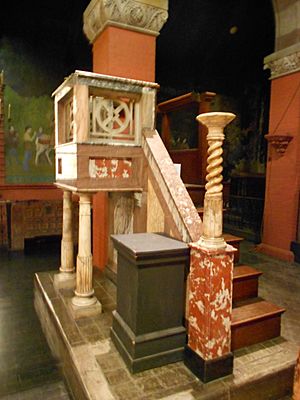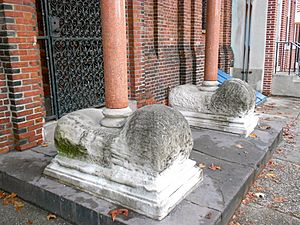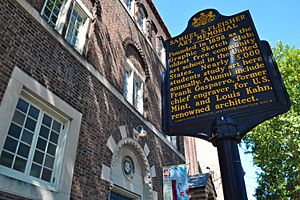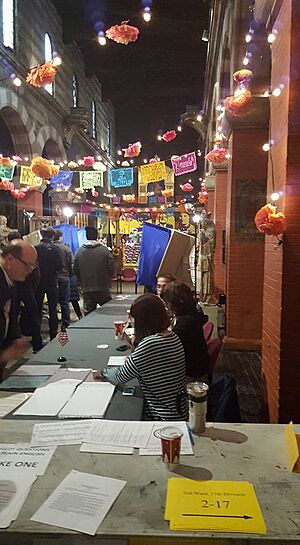Samuel S. Fleisher Art Memorial facts for kids
|
Fleisher, Samuel S., Art Memorial
|
|
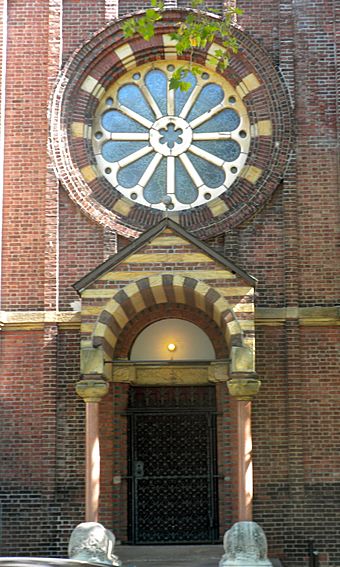 |
|
| Location | 711-721 Catharine St., Philadelphia, Pennsylvania |
|---|---|
| Area | 0.3 acres (0.12 ha) |
| Built | 1857 |
| Architect | Baker, L. C.; Dallett, E. J. |
| Architectural style | Italianate, Romanesque |
| NRHP reference No. | 82001547 |
Quick facts for kids Significant dates |
|
| Added to NRHP | November 14, 1982 |
The Samuel S. Fleisher Art Memorial is a special place in Philadelphia, Pennsylvania. It's made up of four buildings that used to be a church and a college. Today, it's famous for being the home of the Graphic Sketch Club. This club was started by Samuel S. Fleisher and still offers art classes for kids and adults. The best part is that many classes are free or cost very little. This means anyone can learn art, no matter how much money they have or what their background is.
The buildings include a tall bell tower built in 1857, a large church building from 1884-1886, St. Martin's College built in 1906, and two older houses from the 1850s. Since Samuel Fleisher passed away in 1944, the Philadelphia Museum of Art has helped manage the buildings. The Art Memorial was added to the National Register of Historic Places in 1982. You can find it at 711-721 Catharine Street in Philadelphia.
The Church of the Evangelists
The Church of the Evangelists began in 1837. It was a "mission church," which means it was set up to help people in need, especially those living on Catharine Street. Important people like William Welsh and Horace Binney helped start it. The first church building, including the bell tower you see today, was finished in 1857. By 1880, the church faced challenges, possibly because many new people moved into the area who were not Episcopalian.
In 1880, a priest named Henry R. Percival helped the church become strong again. He was well-traveled and loved Italian art and architecture. He wanted to rebuild the church to look like famous Romanesque buildings in Italy, such as St. Mark's Basilica in Venice. The new design, created in 1884, was actually inspired by a church called San Zeno Maggiore in Verona.
Inside the church, there are beautiful paintings called frescoes. Some were painted by famous artists like Robert Henri and Nicola D'Ascenzo, and even by people from the church itself. Many of the decorations inside were never fully finished. The church's design shows influences from Italy, the writer John Ruskin, and old Christian traditions. The church still has its original Wurlitzer pipe organ, which is the last one of its kind installed in a Philadelphia church.
After Percival retired in the 1890s, the church started to struggle again. To help the community, St. Martin's College for Indigent Boys was built in 1906.
Samuel S. Fleisher and His Art Club
Samuel S. Fleisher came from a family of German Jewish immigrants. After college, he became a leader in his family's business, the Fleisher Yarn Company. This company made a lot of yarn for knitting. Samuel Fleisher cared deeply about the people who worked for his company and their families. He also cared about others living in the neighborhood.
He believed that art could bring beauty and inspiration to everyone, especially young people who worked hard every day. He wanted to create a place where "rich and poor alike may give expression to their finer emotions—playgrounds for the soul."
Fleisher started offering free art classes to children in 1898. At first, it was in a different building. Later, this art program became known as the Graphic Sketch Club. It offered free, friendly classes to both children and adults. Everyone was welcome, no matter their race or background. In 1906, the club moved to a bigger building. Then, in 1916, it moved again to the St. Martin's College for Indigent Boys building. The church building itself was bought and turned into an art gallery in 1922.
When Fleisher passed away in 1944, he left his property to the Philadelphia Museum of Art. He wanted them to continue the Graphic Sketch Club. The club was then renamed the Samuel S. Fleisher Art Memorial. In 1983, the Fleisher Art Memorial became its own independent organization, but it still works closely with the Philadelphia Museum of Art today.
Fleisher Art Memorial Today
The Fleisher Art Memorial continues its mission today. It offers many free and low-cost classes and workshops. You can learn drawing, painting, sculpture, ceramics, photography, and even dance! Since 1997, they have also had a program called "Community Partnership in the Arts." This program sends artists into public school classrooms in South Philadelphia. These artists teach students for about 90 minutes, twice a week, for several weeks. Famous artists like ceramist Winnie Owens-Hart have taught there.
The gallery at Fleisher has a wonderful collection of art. You can see art by Violet Oakley, tiles by Henry Chapman Mercer, and old Portuguese and European art. It also has religious art from the original church. There are six old stained glass windows made by Lavers, Barraud and Westlake, and one newer window designed by John LaFarge. You can visit the gallery for free from Monday to Friday, 10 a.m. to 5 p.m., and with shorter hours on Saturdays.
Every year since 2013, the Fleisher Art Memorial works with a group called La Calaca Flaca. Together, they organize a neighborhood celebration for Día de los Muertos (Day of the Dead). This event includes an altar celebration and a procession.
 | Jackie Robinson |
 | Jack Johnson |
 | Althea Gibson |
 | Arthur Ashe |
 | Muhammad Ali |





